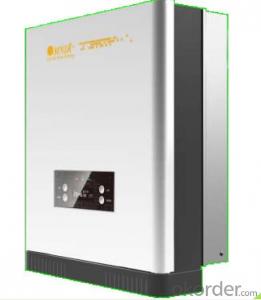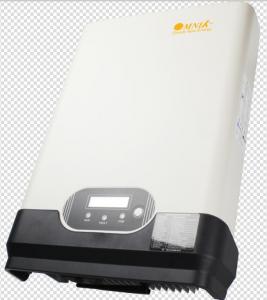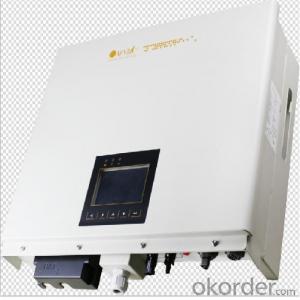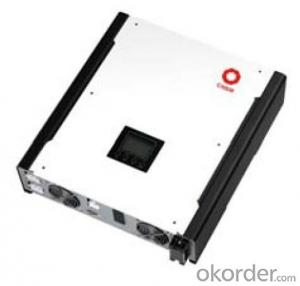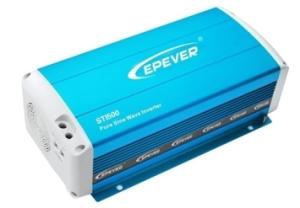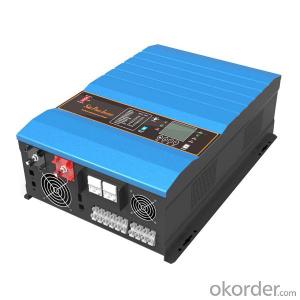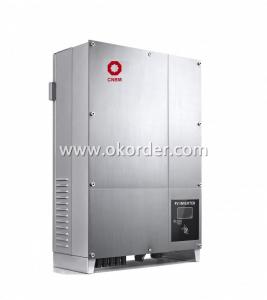on grid solar inverter Omniksol-5.0k-TL2
- Loading Port:
- Shanghai
- Payment Terms:
- TT OR LC
- Min Order Qty:
- -
- Supply Capability:
- 3000 pc/month
OKorder Service Pledge
OKorder Financial Service
You Might Also Like
Omnik new energy solar inverter
Omniksol-2.0k-TL Photon Efficiency up to 3kW
in the world------ Photon tested Jan. 2012.
Omniksol-3k-TL2
Futures
Transformerless design, high efficiency (Max.97.8%,Euro. 97.3%)
Multi -button touch interphase
build in GPRS,WIFI as optional
Smaller,lighter, 5KW,16kg
IP 65 design, suitable for indoor and outdoor installation
10 years warranty(10~25 years as option)
technical data:
Type | Omniksol-3.0k-TL | Omniksol-4.0k-TL | Omniksol-5.0k-TL |
Max. PV-Generator Power [W] | 3400 | 4600 | 5200 |
Max. DC voltage [V] | 590 | 590 | 590 |
MPPT DC voltage Range [V] | 120-500 | 120-500 | 120-500 |
Turn off DC voltage [V] | 90 | 90 | 90 |
Max. DC Current [A] | 12*2 | 16*2 | 18*2 |
Nominal DC Current [A] | 10*2 | 13*2 | 14*2 |
Number of DC Connection | 2 | 2 | 2 |
DC-Connection | MC4 | MC4 | MC4 |
Number of MPP trackers Turn on Power [W] | 2 | 2 | 2 |
Turn on power(W) | 10 | 10 | 10 |
- Q:Can a solar inverter be used with different AC voltages?
- No, a solar inverter cannot be used with different AC voltages. It is designed to convert the DC electricity generated by solar panels into a specific AC voltage, typically matching the grid voltage in the area. Using a solar inverter with a different AC voltage can result in damage to the inverter and potential safety hazards.
- Q:What is the role of a solar inverter in preventing islanding?
- The role of a solar inverter in preventing islanding is to constantly monitor the electrical grid and disconnect the solar system from the grid when a power outage occurs. By detecting changes in grid voltage or frequency, the inverter ensures that the solar system does not continue to generate and supply power to the grid in isolation, which could potentially cause safety hazards for utility workers and damage to electrical equipment.
- Q:Can a solar inverter be used with solar-powered water heaters?
- No, a solar inverter cannot be used with solar-powered water heaters as they operate on different principles. Solar inverters are designed to convert the direct current (DC) generated by solar panels into alternating current (AC) for use in residential or commercial electrical systems. On the other hand, solar-powered water heaters use sunlight directly to heat water, without the need for converting DC to AC. Therefore, these two systems are not compatible with each other.
- Q:Can a solar inverter be used with a solar-powered telecommunications system?
- Yes, a solar inverter can be used with a solar-powered telecommunications system. A solar inverter is an essential component of a solar-powered system as it converts the direct current (DC) generated by solar panels into alternating current (AC) that can be used to power various electrical devices, including telecommunications equipment. By using a solar inverter, the solar-generated electricity can be efficiently utilized to run a telecommunications system, making it a sustainable and environmentally-friendly solution.
- Q:How does a solar inverter handle voltage fluctuations in the grid?
- A solar inverter handles voltage fluctuations in the grid by continuously monitoring the grid voltage. When the voltage exceeds or drops below the acceptable range, the inverter adjusts the power output of the solar panels accordingly. It stabilizes the voltage by regulating the flow of electricity from the solar panels, ensuring a consistent and safe supply of power to the grid.
- Q:How do you choose the right voltage rating for a solar inverter?
- When choosing the right voltage rating for a solar inverter, it is important to consider a few factors. First, you need to determine the voltage of your solar panel array. This will help you match the inverter's voltage rating to ensure compatibility. Additionally, you should consider the voltage requirements of your electrical grid or any appliances you plan to power. The inverter's voltage rating should align with these requirements to ensure efficient energy conversion and safe operation. It is advisable to consult with a professional or an electrical engineer to help you select the appropriate voltage rating for your solar inverter based on your specific needs and system setup.
- Q:How does a solar inverter synchronize with the grid?
- A solar inverter synchronizes with the grid by continuously monitoring the grid's voltage and frequency. It adjusts its own voltage and frequency accordingly to match the grid, allowing the solar power to flow seamlessly into the grid. This synchronization is important to ensure the safe and efficient operation of the solar power system, as well as to prevent any disturbances or damage to the grid.
- Q:Can a solar inverter be used with bifacial solar panels?
- Yes, a solar inverter can be used with bifacial solar panels. Bifacial solar panels have the ability to generate electricity from both sides, capturing sunlight from the front and reflecting light from the rear. A solar inverter is responsible for converting the generated DC (direct current) electricity from the panels into AC (alternating current) electricity for use in homes or businesses. Therefore, a solar inverter is essential for connecting and utilizing the electricity generated by bifacial solar panels.
- Q:What is the role of a solar inverter in voltage control?
- The role of a solar inverter in voltage control is to convert the direct current (DC) produced by solar panels into alternating current (AC) that is suitable for use in homes and businesses. Additionally, a solar inverter helps regulate and stabilize the voltage levels to ensure that the generated electricity matches the required voltage for the connected electrical appliances. This helps prevent overvoltage or undervoltage situations, ensuring a safe and efficient energy supply.
- Q:How does shade affect the performance of a solar inverter?
- Shade negatively impacts the performance of a solar inverter as it reduces the amount of sunlight reaching the solar panels, thereby reducing the amount of electricity generated. Inverters are designed to operate optimally under full sunlight, and when shaded, their efficiency decreases, leading to a decrease in overall energy production. Additionally, shade can cause hotspots on panels, potentially damaging the system and reducing its lifespan. To ensure maximum performance, it is important to minimize shade and ensure unobstructed sunlight for solar inverters.
1. Manufacturer Overview |
|
|---|---|
| Location | |
| Year Established | |
| Annual Output Value | |
| Main Markets | |
| Company Certifications | |
2. Manufacturer Certificates |
|
|---|---|
| a) Certification Name | |
| Range | |
| Reference | |
| Validity Period | |
3. Manufacturer Capability |
|
|---|---|
| a)Trade Capacity | |
| Nearest Port | |
| Export Percentage | |
| No.of Employees in Trade Department | |
| Language Spoken: | |
| b)Factory Information | |
| Factory Size: | |
| No. of Production Lines | |
| Contract Manufacturing | |
| Product Price Range | |
Send your message to us
on grid solar inverter Omniksol-5.0k-TL2
- Loading Port:
- Shanghai
- Payment Terms:
- TT OR LC
- Min Order Qty:
- -
- Supply Capability:
- 3000 pc/month
OKorder Service Pledge
OKorder Financial Service
Similar products
New products
Hot products
Hot Searches
Related keywords
